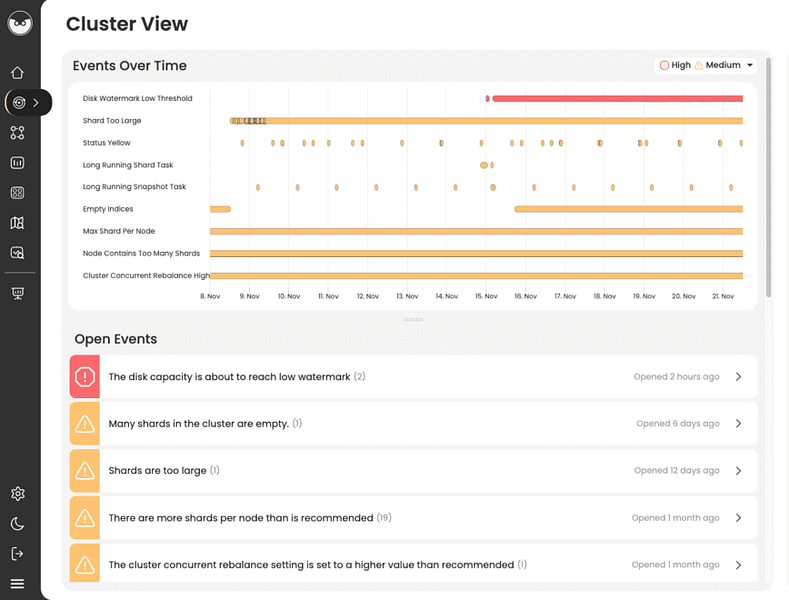Opster Team
Before you begin reading this guide, we recommend you try running the Elasticsearch Error Check-Up which analyzes 2 JSON files to detect many configuration errors.
Briefly, this error occurs when Elasticsearch is unable to use an Azure repository because the client configuration has not been defined. To resolve the issue, define the client configuration with the necessary credentials and settings.
To easily locate the root cause and resolve this issue try AutoOps for Elasticsearch & OpenSearch. It diagnoses problems by analyzing hundreds of metrics collected by a lightweight agent and offers guidance for resolving them.
Take a self-guided product tour to see for yourself (no registration required).
This guide will help you check for common problems that cause the log ” If you want to use an azure repository; you need to define a client configuration. ” to appear. To understand the issues related to this log, read the explanation below about the following Elasticsearch concepts: repositories, plugins, client, repository-azure and azure.
Overview
An Elasticsearch snapshot provides a backup mechanism that takes the current state and data in the cluster and saves it to a repository (read snapshot for more information). The backup process requires a repository to be created first. The repository needs to be registered using the _snapshot endpoint, and multiple repositories can be created per cluster. The following repository types are supported:
Repository types
| Repository type | Configuration type |
|---|---|
| Shared file system | Type: “fs” |
| S3 | Type : “s3” |
| HDFS | Type :“hdfs” |
| Azure | Type: “azure” |
| Google Cloud Storage | Type : “gcs” |
Examples
To register an “fs” repository:
PUT _snapshot/my_repo_01
{
"type": "fs",
"settings": {
"location": "/mnt/my_repo_dir"
}
}Notes and good things to know
- S3, HDFS, Azure and Google Cloud require a relevant plugin to be installed before it can be used for a snapshot.
- The setting, path.repo: /mnt/my_repo_dir needs to be added to elasticsearch.yml on all the nodes if you are planning to use the repo type of file system. Otherwise, it will fail.
- When using remote repositories, the network bandwidth and repository storage throughput should be high enough to complete the snapshot operations normally, otherwise you will end up with partial snapshots.
Overview
A plugin is used to enhance the core functionalities of Elasticsearch. Elasticsearch provides some core plugins as a part of their release installation. In addition to those core plugins, it is possible to write your own custom plugins as well. There are several community plugins available on GitHub for various use cases.
Examples
Get all of the instructions for the plugin:
sudo bin/elasticsearch-plugin -h
Installing the S3 plugin for storing Elasticsearch snapshots on S3:
sudo bin/elasticsearch-plugin install repository-s3
Removing a plugin:
sudo bin/elasticsearch-plugin remove repository-s3
Installing a plugin using the file’s path:
sudo bin/elasticsearch-plugin install file:///path/to/plugin.zip
Notes and good things to know
- Plugins are installed and removed using the elasticsearch-plugin script, which ships as a part of the Elasticsearch installation and can be found inside the bin/ directory of the Elasticsearch installation path.
- A plugin has to be installed on every node of the cluster and each of the nodes has to be restarted to make the plugin visible.
- You can also download the plugin manually and then install it using the elasticsearch-plugin install command, providing the file name/path of the plugin’s source file.
- When a plugin is removed, you will need to restart every Elasticsearch node in order to complete the removal process.
Common issues
- Managing permission issues during and after plugin installation is the most common problem. If Elasticsearch was installed using the DEB or RPM packages then the plugin has to be installed using the root user. Otherwise you can install the plugin as the user that owns all of the Elasticsearch files.
- In the case of DEB or RPM package installation, it is important to check the permissions of the plugins directory after you install it. You can update the permission if it has been modified using the following command:
chown -R elasticsearch:elasticsearch path_to_plugin_directory
- If your Elasticsearch nodes are running in a private subnet without internet access, you cannot install a plugin directly. In this case, you can simply download the plugins and copy the files inside the plugins directory of the Elasticsearch installation path on every node. The node has to be restarted in this case as well.
Overview
Any application that interfaces with Elasticsearch to index, update or search data, or to monitor and maintain Elasticsearch using various APIs can be considered a client
It is very important to configure clients properly in order to ensure optimum use of Elasticsearch resources.
Examples
There are many open-source client applications for monitoring, alerting and visualization, such as ElasticHQ, Elastalerts, and Grafana to name a few. On top of Elastic client applications such as filebeat, metricbeat, logstash and kibana that have all been designed to integrate with Elasticsearch.
However it is frequently necessary to create your own client application to interface with Elasticsearch. Below is a simple example of the python client (taken from the client documentation):
from datetime import datetime
from elasticsearch import Elasticsearch
es = Elasticsearch()
doc = {
'author': 'Testing',
'text': 'Elasticsearch: cool. bonsai cool.',
'timestamp': datetime.now(),
}
res = es.index(index="test-index", doc_type='tweet', id=1, body=doc)
print(res['result'])
res = es.get(index="test-index", doc_type='tweet', id=1)
print(res['_source'])
es.indices.refresh(index="test-index")
res = es.search(index="test-index", body={"query": {"match_all": {}}})
print("Got %d Hits:" % res['hits']['total']['value'])
for hit in res['hits']['hits']:
print("%(timestamp)s %(author)s: %(text)s" % hit["_source"])
All of the official Elasticsearch clients follow a similar structure, working as light wrappers around the Elasticsearch rest API, so if you are familiar with Elasticsearch query structure they are usually quite straightforward to implement.
Notes and Good Things to Know
Use official Elasticsearch libraries.
Although it is possible to connect with Elasticsearch using any HTTP method, such as a curl request, the official Elasticsearch libraries have been designed to properly implement connection pooling and keep-alives.
Official Elasticsearch clients are available for java, javascript, Perl, PHP, python, ruby and .NET. Many other programming languages are supported by community versions.
Keep your Elasticsearch version and client versions in sync.
To avoid surprises, always keep your client versions in line with the Elasticsearch version you are using. Always test clients with Elasticsearch since even minor version upgrades can cause issues due to dependencies or a need for code changes.
Load balance across appropriate nodes.
Make sure that the client properly load balances across all of the appropriate nodes in the cluster. In small clusters this will normally mean only across data nodes (never master nodes), or in larger clusters, all dedicated coordinating nodes (if implemented) .
Ensure that the Elasticsearch application properly handles exceptions.
In the case of Elasticsearch being unable to cope with the volume of requests, designing a client application to handle this gracefully (such as through some sort of queueing mechanism) will be better than simply inundating a struggling cluster with repeated requests.
Log Context
Log “If you want to use an azure repository; you need to define a client configuration.”classname is AzureRepositoryPlugin.java We extracted the following from Elasticsearch source code for those seeking an in-depth context :
@Override
public void reload(Settings settings) {
// secure settings should be readable
final Map clientsSettings = AzureStorageSettings.load(settings);
if (clientsSettings.isEmpty()) {
throw new SettingsException("If you want to use an azure repository; you need to define a client configuration.");
}
azureStoreService.refreshAndClearCache(clientsSettings);
}
}
Find & fix Elasticsearch problems
Opster AutoOps diagnoses & fixes issues in Elasticsearch based on analyzing hundreds of metrics.
Fix Your Cluster IssuesConnect in under 2 minutes

Arpit Ghiya
Senior Lead SRE at Coupa





